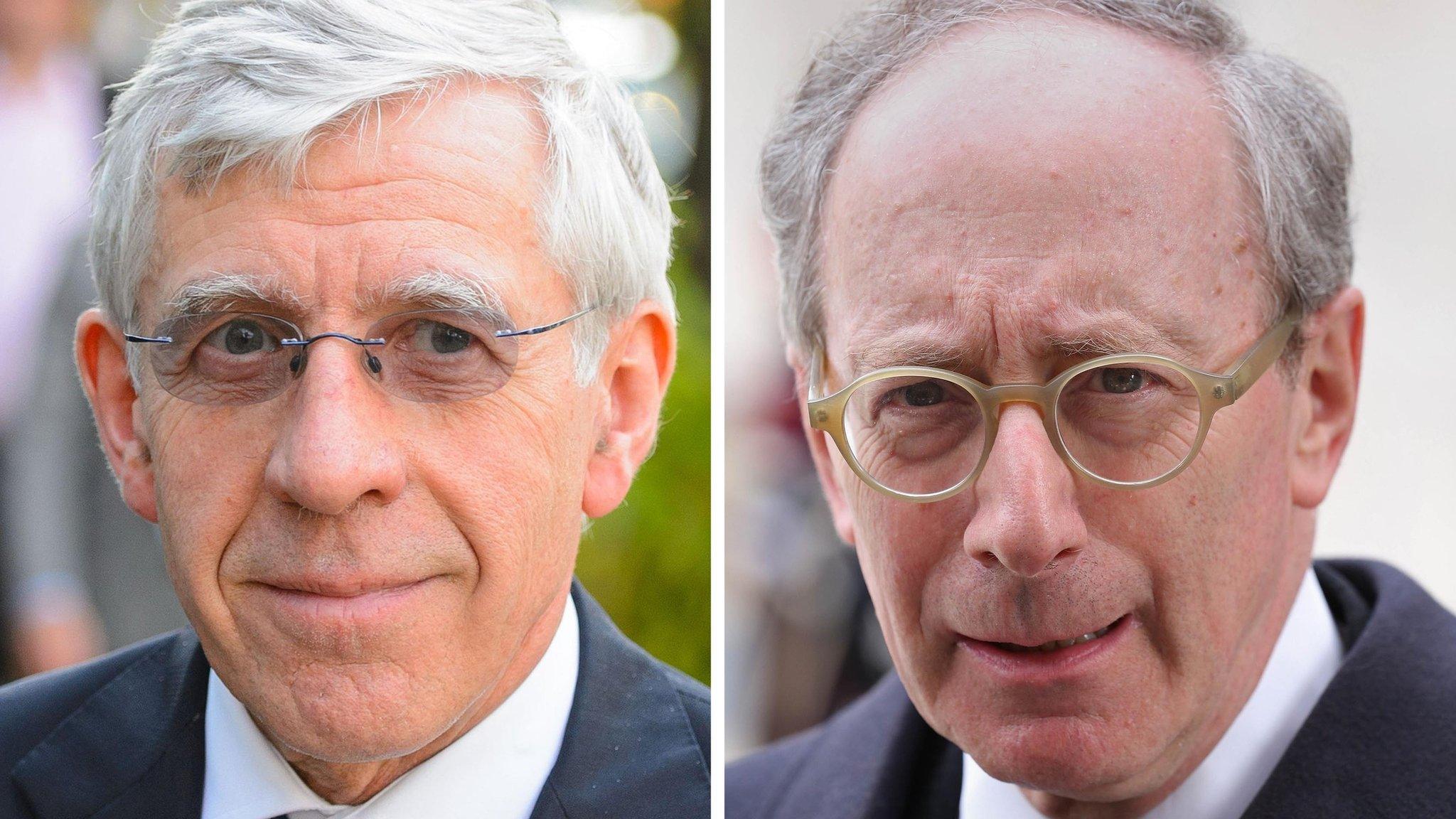MPs reject Labour's call for a ban on second jobs
- Published
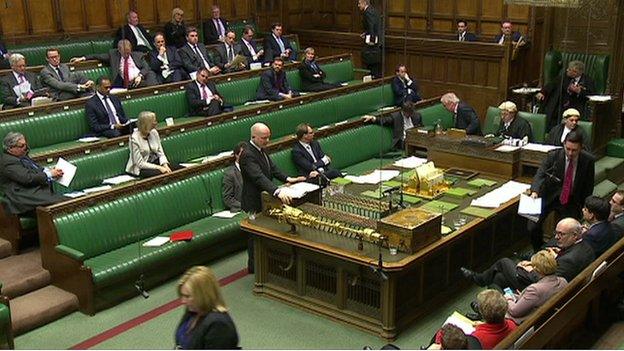
The House of Commons has defeated Labour's call for a ban on MPs holding paid directorships or consultancies.
Labour had argued that the move was necessary to "restore public trust" in politics following a cash for access scandal.
But the government said the motion was "unclear" and more about creating headlines than providing a solution.
MPs sided with the government to defeat the Labour motion by 287 to 219. The government's amendment was approved.
Labour said it would honour its commitment and amend its own standing orders to ensure the ban applied to its candidates and MPs.
The debate in the House of Commons was sparked by allegations against Jack Straw and Sir Malcolm Rifkind.
The two former foreign secretaries deny wrongdoing after being secretly recorded apparently offering their services to a private company for cash.
'Grey areas'
Introducing the opposition motion, shadow Commons leader Angela Eagle said it was time to make a "decisive break" with the status quo on members' remunerated interests.
She said the public deserved to be "safe in the knowledge" that every MP was working and acting in their interests - and not for somebody paying them.
Ms Eagle said the current situation was "untenable", adding that the rules were "riddled with grey areas and open to endless convenient interpretation".
That is why the House should support Labour's plan to stop MP from holding a directorship or paid consultancy from the next Parliament, she argued.
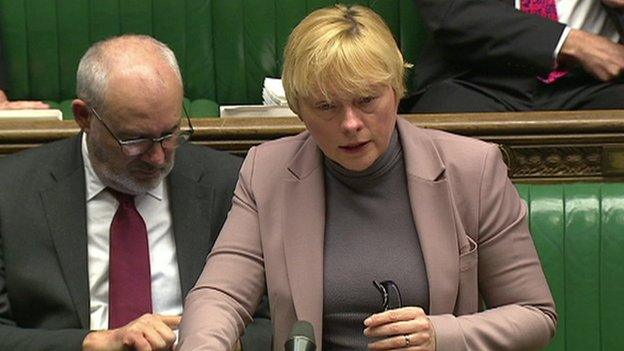
Ms Eagle said the current situation "has become untenable"
But the Conservative leader of the House, William Hague, contended that "by far the greatest single outside influence" on MPs was union influence on the Labour Party.
He said out of the candidates selected for 150 Labour target seats, 83 were linked to the unions, and 49 of those to Unite.
Labour's motion was calculated to create a headline rather than to solve a problem, he argued, adding that it showed little understanding of business and was "unclear".
He warned that it could create a House of Commons "consisting entirely of people who are either rich or professional politicians throughout their lives".
'On the hoof'
While not mentioned in the motion, Labour is said to be mooting the idea of capping MPs' outside earnings to between 10% and 15% of their salary.
But Mr Hague said the opposition did not know how this cap would operate in practice, such as whether it would apply to a farm-owning MP.
"Would [former Labour PM] Lord Callaghan [who owned a farm] have had to resign from the House every time there was a good harvest?" he asked, to laughter from MPs.
The mood of the House was split largely on party lines; with the Conservatives against the motion, and Labour in favour. Tory MP Alan Duncan argued that the move was aimed at excluding Conservatives from politics as they were more likely to sit on company boards or hold other business roles.
At PMQs, Mr Cameron said the government has tightened up the rules on lobbying and introduced a right of recall
Mr Duncan, a former minister, warned that Parliament could end up being filled with full-time career politicians, under Labour's plan.
"We're in danger of becoming a low-achieving, sparring sort of shallow chamber where there is insufficient experience to address the big issues of the day," he said.
But Tessa Munt, the Liberal Democrat MP for Wells, said she believed the public would be "shocked" to know MPs earned a reported £7.4m from outside work in 2014.
"This is about money and time and priorities," she said, adding that MPs had to make a choice between earning money or public service.
Labour's motion, which stated no MPs should be allowed to hold paid directorships or consultancies from the next Parliament, was rejected by 287 votes to 219.
The government's own amendment, which reminded MPs to uphold the parliamentary code of conduct, was passed unopposed.

What are the rules?
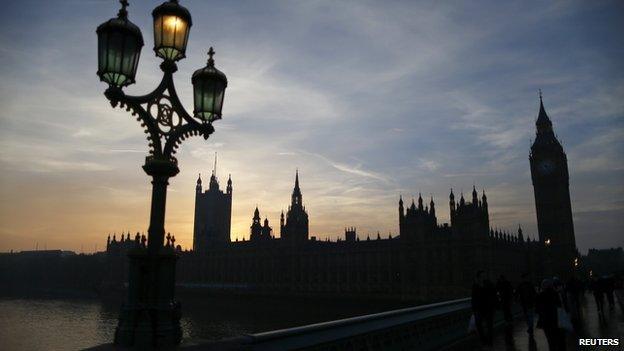
The Commons Code of Conduct, external states that MPs must not act as a "paid advocate" - taking payment for speaking in the House, asking a parliamentary question, tabling a motion, introducing a bill or tabling or moving an amendment to a motion or bill or urging colleagues or ministers to do so.
They have to declare their financial interests, including paid employment outside Parliament, in the Register of Members' Financial Interests, external.
There are also guidelines for ministers leaving office: former Cabinet members must normally wait three months after leaving office before they can accept any kind of paid employment, and should not lobby existing ministers on behalf of any organisation for which they are employed for two years after leaving office.

David Cameron and Ed Miliband clashed over the subject of MPs' second jobs at Prime Minister's Questions earlier in the day.
Mr Cameron said he was not ruling out further change, but he said Labour's proposals would allow someone to be a paid union official but would not let them "run a family business or a family shop".
The Labour leader offered to include a ban on MPs holding trade union posts, as demanded by the Tories and Lib Dems.
The amendment was not allowed during the Commons debate on second jobs due to procedural reasons.
BBC political editor Nick Robinson said he was not aware of any Labour MPs who were paid trade union officials, although many receive funding from unions.
Speaking on a visit to Colchester, Lib Dem leader Nick Clegg said voters would not accept MPs regarding politics "as nothing more than a part-time hobby", but added that excluding someone who had "worked for decades in a family firm" was "probably a bit extreme".
- Published25 February 2015

- Published24 February 2015
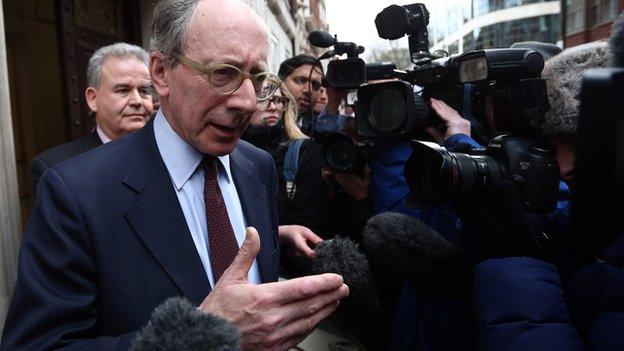
- Published23 February 2015
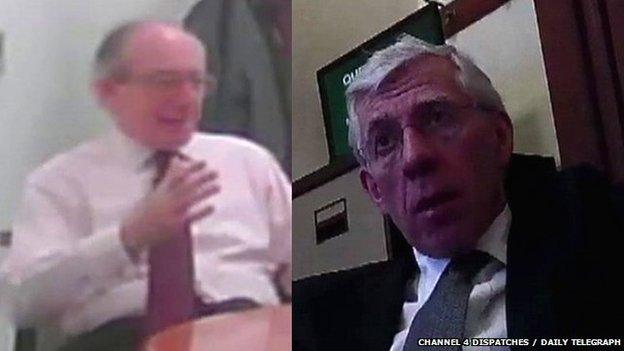
- Published25 February 2015
